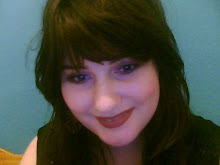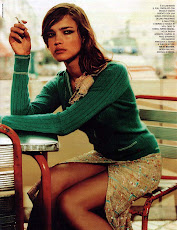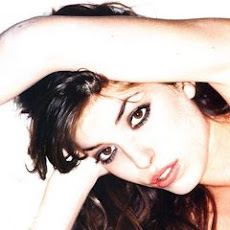
Now 62, the former Sixties icon relives her childhood
Jane Birkin looks boyish - sticky-outy hair, jeans, three sweaters over a braless chest, no make-up - and the artifice, all the more striking given her beauty, makes her seem vulnerable. The impression is confirmed when she launches into a monologue about her nostalgia for her childhood and, especially, about the holidays her family spent on the Isle of Wight.
“The rough side of the island, I hasten to add, not the chic side,” she says. “It was the black beach, the black sand, and it was being with my brother and my sister and my parents like some sort of sublime ... you know the things that hold doors up in Italy? What are they called?” Plinths, perhaps? “Sublime ghosts, they are in the doorways of my life, and being a 12-year-old on a bike on the Isle of Wight with my brother and sister and ma and pa is for me the epitome of happiness.”
This does not match the rather loucher associations that continue to follow Birkin more than 40 years after her beauty - and it was incandescent - made her a Sixties icon. She was the cinema's first full-frontal nude, in Antonioni's Blowup, and the wife and muse of Serge Gainsbourg, the late French pop-poet with whom she confirmed her image as an abandoned sexpot by breathing heavily on Je t'aime ... moi non plus. She was also married to the composer John Barry. At 62 she has sung lots of other songs - and she'll be singing again at the Barbican in London next Saturday - and made more than 60 films. But it's the apparently naughty breathing that continues to define her, as she knows perfectly well.
She lives in Paris and we meet in a discreetly chic hotel in a business district. Her riff on childhood has emerged because it is a theme on her album Enfants d'Hiver, for which - for the first time - she written her own lyrics.
“When you recognise the happiest time of your life then you look for it again and you try to create it with your own children,” she adds. “It works, to a great degree. I bought a house in Normandy. I let my children go off all day the way my parents let us go off. I didn't bug them. I wanted a place that wasn't like Serge's, where you couldn't even put a cup on the table without him looking nervous. You felt as if you were a right mess, as if you were disturbing his great mind.”
Her autobiographical album was begun ten years ago. “I jumped the bits everybody knows - of being married to John, of being with Serge. You just wake up on a beach one day when you're this retarded adolescent. You don't really correspond with much. You still feel exactly the same as the girl on the bike on the Isle of Wight. It was a nice feeling. I wore my brother's clothes, and tried to get into his school. I even managed not to turn into a girl until I was 16 so there was a definite psychological effort on my part that worked extremely well ” She goes on in her charming, dotty way, not looking at me but with her eyes squinting elsewhere, and you feel entranced that she is being so candid.
But this is not a conversation, just her holding forth about how she refuses to completely grow up. It is no less enticing for that, though, and all delivered in an accent that veers from a slightly quaint RP to French. You live on your own, I say. “I live with my bulldog, which is not on my own,” she says emphatically. “The redoutable Dora is my boss, unfortunately, because she's dominant. And I live with a marmalade cat. I'm contemplating a parrot whenever the cat should decide to decease itself. It is nearly 21. So I'm not alone.”
She has six adored friends for whom she throws dinner parties, she goes to the theatre four times a week and she sits on charity committees, not least to support the Burmese pro-democracy leader Aung San Suu Kyi. “After shouting my mouth off in Burma I don't think I will be very welcome again but I was able to sing in the street, I was able to do a concert.”
At night she retires with a book and sleeping tablets. And yes, she does, just occasionally, think about being alone and getting older. “It's when you wake up in the morning and ache to have the heavy feeling of someone lying on you. And the day I wake up with pockets under my eyes and then say it's OK, as I like other people's veins and their lines and their faces. Will anyone dare say that they will be your last love? It would be rather nice but it doesn't matter because I'm doing very nicely as I am.”
A few minutes later I pull her back to this and she forgets to be quite so resolutely positive. “I don't know who would put up with it because I rush so much and it's come to practically a frenzy, which I know is also because I don't like going back home at night very much.”
Her preferred world is her family, she says, and she is lucky to live at the crossroads of her three daughters' lives. They are now more famous than she is, she insists. She gives brief biographies: Charlotte Gainsbourg, the great actress; Lou Doillon, hailed as born for the stage by The New York Times; Kate Barry with her photographic exhibitions in Paris and the abandoned feeling that her work conjures up. And she's off on her theme again. They spend the holidays together and this enables her to recreate the sense of being secure that she associates with her childhood.
“It's the grandchildren I long to be alone with because then we can have so much fun. I rush to Brittany with my grandchildren every second I have. My children are really decent because they know I drive really badly and yet they leave me with Marlowe and Alice and Ben. I've had Roman all my life because I was a grandmother at 39, so he lives in a little room above mine. He's like a fourth child, which is lovely, but with the little ones we creep back into childhood again because no one's looking and we can go off on to a really wild beach in Finistère. You can let them play, their shrieks of laughter being cut off on the little island that you can get to on low tide, but we always get caught out. Then you find yourself shrieking with laughter again and everything is back to normal.”
She went to a hypnotist because she was frightened of being on television. “He said, ‘Why are you afraid of being judged so much? Where do you feel unjudged? Where do you feel safe?' I said, 'With my children. Only with the children.' He said, 'So you don't think children have judgment.' I said, 'Of course they do. It's just that they don't mind if you are being a fool.' If you dress them up in leaves you can pretend you're in a pirate's cove. As long as you're out of eyeshot of grown-ups. I love it.”
She no longer does parties or decadence. “Oh goodness, no. I did that so well. I'm not going to do anything like that less well. So no more clubs,” she says. “I really don't feel celebrity. I was well known very young and then I was with a very well-known person. I knew John Barry's talent was vast, he'd already had two Oscars when I was married to him. I was with people who were so much grander than I was and then when I met Serge we were on television every day practically.”
She fishes her make-up bag out of the leather bucket that was named after her, the Hermès Birkin. Hers is battered, with a ribbon and beads and chains wound around the handles. She finds her favourite potions, dabs her peachy skin lightly with blusher and protests that any old red crayon and a little pot of red stuff will do for the lips. “Search for the glasses is the first thing to put on because you look rather gorgeous before you find them. You think, ‘Oh, pas mal'. When the truth hits you, then quickly [splash on] a bit of cold water and any cream that you've got hanging around. I don't like mascara because I think after a certain age too much make-up on and you look like a travesty. I look like a fellow dressed up as a lady.” She is nervous about the idea of cosmetic surgery. “If they get it wrong, if they pull you and it's uneven and it's not you any more ...”
Her album is illustrated with family photographs from the Isle of Wight, and there she is, the boyish 12-year-old who looks like an urchin, the beautiful parents, the incomparable blend of freedom and security. The memories make her very happy.
www.thetimes.co.uk

.jpg)



1 comment:
ghd hair straightener vsvnqqgs ghd australia dyobysdf ghd hair straighteners chaduawz
Post a Comment